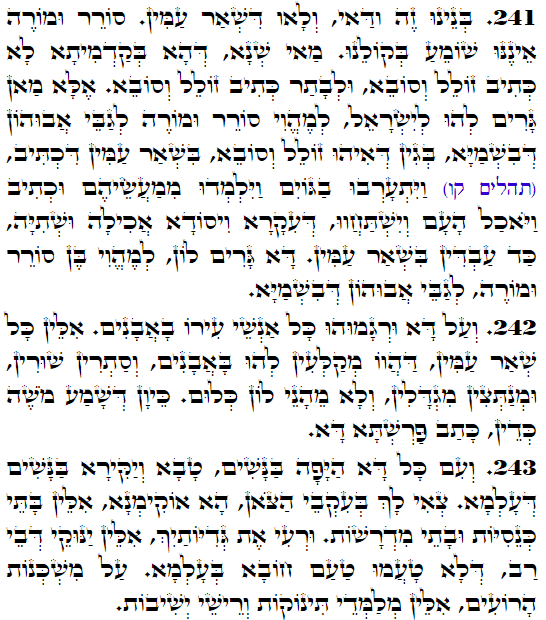Daily Zohar # 3397 – Balak – Holy mouth
.
Hebrew translation:
242. וְעַל זֶה, וּרְגָמֻהוּ כָּל אַנְשֵׁי עִירוֹ בָאֲבָנִים. אֵלֶּה כָּל שְׁאָר הָעַמִּים שֶׁהָיוּ מְקַלְּעִים אוֹתָם בַּאֲבָנִים, וְסוֹתְרִים אֶת הַחוֹמוֹת וּמְנַתְּצִים אֶת הַמִּגְדָּלִים, וְלֹא מוֹעִיל לָהֶם כְּלוּם. כֵּיוָן שֶׁשָּׁמַע מֹשֶׁה, אָז כָּתַב פָּרָשָׁה זוֹ.
243. וְעִם כָּל זֶה – הַיָּפָה בַּנָּשִׁים, טוֹבָה וְנִכְבָּדָה בִּנְשׁוֹת הָעוֹלָם. צְאִי לָךְ בְּעִקְבֵי הַצֹּאן, הֲרֵי בֵּאַרְנוּ – אֵלּוּ בָּתֵּי כְּנֵסִיּוֹת וּבָתֵּי מִדְרָשׁוֹת. וּרְעִי אֶת גְּדִיֹּתַיִךְ – אֵלּוּ תִינוֹקוֹת שֶׁל בֵּית רַבָּן שֶׁלֹּא טָעֲמוּ טַעַם חֵטְא בָּעוֹלָם. עַל מִשְׁכְּנוֹת הָרֹעִים – אֵלּוּ מְלַמְּדֵי תִינוֹקוֹת וְרָאשֵׁי יְשִׁיבוֹת.
.
There is no Zohar for Devarim and we continue this week with Balak.
Zohar Balak
If you missed previous studies, read from DZ 3395 #237
Deuteronomy 21:20 “וְאָמְרוּ אֶל זִקְנֵי עִירוֹ בְּנֵנוּ זֶה סוֹרֵר וּמֹרֶה אֵינֶנּוּ שֹׁמֵעַ בְּקֹלֵנוּ זוֹלֵל וְסֹבֵא.”
“And they shall say to the elders of his city, ‘This son of ours is stubborn and rebellious; he will not obey our voice; ‘he is a glutton and a drunkard.’”
#241
When the father and the mother say ‘This son of ours’, they refer to the children of Israel and not to the other nations. In this verse they add another type of behavior that was not mentioned earlier and, saying ‘he is a glutton and a drunkard’.
The Zohar asks what made Israel be ‘stubborn and rebellious’ in front of their father in heavens, and answers that it was caused by getting mingled with the other nations and learning from their actions.
Psalms 106:35 “וַיִּתְעָרְבוּ בַגּוֹיִם וַיִּלְמְדוּ מַעֲשֵׂיהֶם.” “But they mingled with the Gentiles And learned their works;”
Numbers 25:2
“וַתִּקְרֶאןָ לָעָם לְזִבְחֵי אֱלֹהֵיהֶן וַיֹּאכַל הָעָם וַיִּשְׁתַּחֲוּוּ לֵאלֹהֵיהֶן.” “They invited the people to the sacrifices of their gods, and the people ate and bowed down to their gods.”
The desire for pleasures represented here by food drives the people to follow false gods.
#242
Deuteronomy 21:21
“וּרְגָמֻהוּ כָּל אַנְשֵׁי עִירוֹ בָאֲבָנִים וָמֵת וּבִעַרְתָּ הָרָע מִקִּרְבֶּךָ וְכָל יִשְׂרָאֵל יִשְׁמְעוּ וְיִרָאוּ.” “Then all the men of his city shall stone him to death with stones; so you shall put away the evil from among you, and all Israel shall hear and fear.”
The angel Yofiel completes his explanation and says that it relates to the other nations that throw stones on them. They knock down walls and destroy towers, but they cannot prevail against Israel. After this explanation, Moses wrote this part in the Torah.
#243
The ‘fairest among women’ is Malchut that is the best and most honored among all women in the world. She joins the children of Torah schools that never had the taste of sin, their teachers, and the leaders of the Yeshivot.
Lesson;
The lesson that the angel Yofiel taught Moses is that the children of Israel are protected because of the seed of their faith is rooted deep in their souls and when they lose the path, the Shechina follow the children that study Torah because their purity allows the Shechina to bring support for all Israelites.
The sages say that the world is kept in existence by the merit of the vapor that comes from the mouth of children that speaks the words of Torah.
“שאין העולם מתקיים אלא בזכות הבל פיהם של תינוקות של בית רבן”
Below two of many references in the Zohar to the value of the little children that study the Torah. The first reference describes the Mashiach that on his way to come down to the world, he passes through different palaces in heavens and stops in the palace of righteous who suffered greatly in their lives, little children that died before their time, and souls of those who were crying for the destruction of the Holy Temple.
We are no longer little children but if we study and connect with a pure heart and with the desire to see the coming of Mashiach and the third and everlasting Holy Temple, we open ourselves for the Shechina to bring light into our lives and the world.
When we hear about a little child that dies before his time, we should immediately pray for the coming of Mashiach to transform the pain into the creation of a large vessel that will draw Mashiach to this world.
Zohar Beresheet-2 #16
Showing the hebrew translation of the Aramaic Zohar.
https://unityzohar.com/zohar-books/beresheet-b/15
הוּא נוֹסֵעַ מֵהַהֵיכָל הַזֶּה וְנִכְנָס. בַּהֵיכָל הַשְּׁלִישִׁי, וְשָׁם כָּל אוֹתָם בְּנֵי חֳלָאִים וּכְאֵבִים קָשִׁים, וְכָל אוֹתָם תִּינוֹקוֹת שֶׁל בֵּית רַבָּן שֶׁלֹּא הִשְׁלִימוּ יְמֵיהֶם, וְכָל אוֹתָם הָעֲצוּבִים עַל חֻרְבַּן בֵּית הַמִּקְדָּשׁ [וְשָׁפְכוּ] וְהָיוּ שׁוֹפְכִים דְּמָעוֹת. כֻּלָּם עוֹמְדִים בְּאוֹתוֹ הֵיכָל, וְהוּא מְנַחֵם אוֹתָם.
Pekudei #693
https://unityzohar.com/zohar-books/pekudei/692
וְאֵלּוּ הִתְמַנּוּ עַל אוֹתוֹ הֶבֶל הַתִּינוֹקוֹת שֶׁלּוֹמְדִים תּוֹרָה לְקַיֵּם אֶת הָעוֹלָם, וְאֵלּוּ נוֹטְלִים אוֹתוֹ הַהֶבֶל וּמַעֲלִים אוֹתוֹ לְמַעְלָה. וְכָל הֶבֶל וְהֶבֶל שֶׁל אוֹתָם תִּינוֹקוֹת שֶׁלּוֹמְדִים בַּתּוֹרָה לְקַיֵּם אֶת הָעוֹלָם, נַעֲשֶׂה מִמֶּנּוּ רוּחַ אַחַת, וְעוֹלָה אוֹתָהּ רוּחַ לְמַעְלָה וּמִתְעַטֶּרֶת בַּעֲטָרָה קְדוֹשָׁה, וּמִתְמַנֶּה שׁוֹמֵר הָעוֹלָם, וְכֵן כֻּלָּם.
{||}

 Previous: Balak
Previous: Balak


